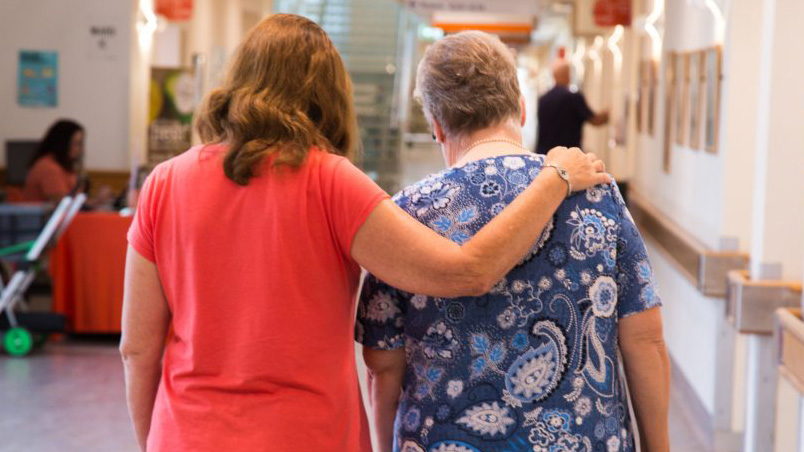Carer Program

People who provide care on a regular, ongoing basis for a family member or friend with:
- disability
- mental illness
- drug and/or alcohol dependency
- chronic condition
- or is frail and aged.
Care is provided without payment apart from a Carer Payment or Carer Allowance if eligible.
Carers can be parents, grandparents, spouses, partners, siblings, children, relatives, friends or neighbours.
A person is not a carer if they care for a person as a paid employee, a volunteer or as part of education or training.
Most carers will receive health services for themselves and for the person for whom they care. We listen to carers and recognise their unique knowledge and experience. Involving a carer as a partner in care improves outcomes for our patients.
For staff – education on identifying and supporting carers is available on MyHealthLearning, ‘Partnering with Carers’ Module (58522879)
Working Carers are MNCLHD staff and carers of our patients, who ‘juggle work and caring at home’.
Key links for working carers and their employers
Key links for employers
Information provided by Carers Australia: ‘Benefits of Investing in Carers at Work’, shows how workplace arrangements for carers can have significant benefits for employers, including staff retention, improved productivity and job satisfaction of employees, which in turn reduces recruitment and training costs.
The site has links to the following information:
- reduced costs of employee turnover
- increased productivity
- improved service delivery
- reducing employee stress and absenteeism
- attracting quality workers
- increased staff morale
- building a resilient workforce.
The Carers + Employers Program
The Carers + Employers Program defines best practice standards for supporting staff with caring responsibilities – and includes the top 10 tips for employers.
Supporting carers is the responsibility of all levels of governments and the community as a whole. The NSW Government is committed to contributing to carers achieving quality of life for themselves and for the people they support. NSW Health Recognition and Support for Carers: Key Directions 2018-2020 – guides NSW employees on how to recognise, support and partner with carers.
The NSW Health Carer Program provides information on:
TOP 5
TOP 5 is a simple form used by staff, to assist with care of people with dementia or other disabilities, who can have difficulty communicating their needs to strangers or difficulty coping in an unfamiliar environment.
Often carers may hold the key to their communication and behaviour.
TOP 5 collects unique knowledge, about the person they care for, from carers.
Multidisciplinary team meetings
Carers can ask to be involved in discussions where decisions will be made that will impact on the care you provide.
The patient will need to provide consent.
Patient information and privacy: a guide for carers and family
The Patient Information and Privacy pamphlet explains when health staff can share patient information and what the patient and their carer can do to help health staff share patient information.
The pamphlet includes links to additional sources of information about privacy and is available in Arabic [PDF], Chinese, Vietnamese and English.
Resources for carers
For patients with dementia or cognitive impairment who are removed from their usual place of residence and are experiencing pain or discomfort, anxiety levels are often high. It may not be easy for staff to communicate effectively or understand the often subtle signs that may indicate that a patient’s anxiety is escalating. The value of carer information cannot be under estimated.
TOP 5 is a simple process that encourages health professionals to engage with carers to gain valuable non-clinical information to help personalise care.
This information is documented on a TOP 5 form and made available to every member of the care team to improve communication between the patient, the carer and the health care team.
Up to five strategies may be recorded, however, in some cases there may only be one or two relevant strategies.
Visit TOP 5 to find out more about this program.
Carer Gateway provides services such as carer support planning, counselling, peer support, carer directed funding packages and emergency respite. Carers can contact Carer Gateway on 1800 422 737 or visit Carer Gateway.
The patient information and privacy pamphlet explains when health staff can share patient information and what the patient and their carer can do to help health staff share patient information.
The pamphlet includes links to additional sources of information about privacy and is available in Arabic, Chinese, Vietnamese and English.
